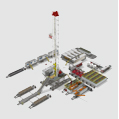TSC Corporate Governance
TSC Corporate Governance
TSC recognizes the importance of good corporate governance to its healthy growth and has devoted considerable efforts to identify and formulate corporate governance practices appropriate to the needs of its business. TSC continually incorporates the essence of corporate governance best practices into its management structure and internal control procedures, as we strive to maintain the highest standards in integrity and ethics in all aspects of our business activities, and to ensure the full compliance of our operations with applicable laws and regulations. By achieving high standards of corporate governance, the Directors believe that sound and reasonable corporate governance practices are essential for the rapid growth of the Group and for safeguarding and maximizing shareholders' interests.
Corporate Governance Practices
TSC applies the principles and complies with all applicable provisions under the Code on Corporate Governance Practices (the "Code") as set out in Appendix 14 of the Rules Governing the Listing of Securities on the Stock Exchange of Hong Kong Limited (the "Listing Rules").
Directors' Securities Transactions
TSC adopts a code of conduct regarding Directors' securities transactions on terms no less exacting than the required standard of dealings as set out in Appendix 10 of the Listing Rules.
Board of Directors
The Board is responsible for managing TSC on behalf of shareholders. The Board is of the view that it is the Directors' responsibilities to create value for shareholders and safeguard the best interests of TSC and the shareholders by discharging its duties in a dedicated, diligent and prudent manner on the principle of good faith. The Board is also responsible for decisions in relation to the overall strategic development of the Group's business. Responsibilities in relation to daily and execution of the strategic business plans are delegated to each of the executive Directors and management.
The Board comprises nine Directors, including three executive Directors, namely Mr. Wang Hongyuan, Mr. Jiang Bing Hua and Mr. Zhang Menggui; three non-executive Directors, namely Mr. Wang Jianzhong, Ms. Li Rong and Mr. Lou Dongyang; and three independent non-executive Directors, namely Mr. Chan Ngai Sang, Kenny, Mr. Zou Zhendong and Mr. Chen Weidong. As over half of the members of the Board being non-executive and they have not participated into the management of TSC, the Board is therefore able to exercise independent judgment on corporate affairs and provide the management with a diverse and objective perspective on issues. The Board believes that current board size is appropriate based on TSC' s present circumstances and will periodically evaluate the need for increasing or decreasing its size.
Remuneration Committee
The remuneration committee was established on 20 October 2005 comprising three independent non-executive Directors, namely Mr. Zou Zhendong (being the Chairman), Mr. Chan Ngai Sang, Kenny, and Mr. Chen Weidong; and two executive Directors, namely, Mr. Wang Hongyuan ad Mr. Jiang Bing Hua. The role and function of the remuneration committee included the determination of the specific remuneration packages of all executive Directors and senior management, including benefits-in-kind, pension rights and compensation payments, including any compensation payable for loss or termination of their office or appointment, and make recommendations to the Board of the remuneration of Directors. The remuneration committee will consider and give due regard to both the performance levels of, and a fair reward for, the chairman, executive Directors and the senior management and to the interest of all the shareholders of TSC in light of the financial and commercial circumstances of it from time to time. No Director shall be involved in deciding his own remuneration.
Nomination Committee
The nomination committee was established on 5 June 2009. A majority of its current members are independent non-executive Directors. Currently, the members of the committee are Mr. Wang Hongyuan (being the Chairman), Mr. Zhang Menggui, Mr. Chan Ngai Sang, Kenny, Mr. Zou Zhendong and Mr. Chen Weidong. The remit of the nomination committee is to identify candidates for appointment to the Board and to review the structure, size and composition of the Board. Before an appointment is made, the nomination committee evaluates the balance of skills, knowledge and experience on the Board and, in the light of this evaluation, prepares a description of the role and capabilities required for a particular appointment. If deemed appropriate, external consultants may be used to identify suitable candidates.
Audit Committee
TSC established an audit committee with written terms of reference since October 2005. To ensure on-going compliance with the newly amended Code, the audit committee's terms of reference have been revised to take into account the Board' s responsibility for reviewing the adequacy of staffing of the financial reporting functions and the oversight role of the audit committee. The audit committee comprises a minimum of three members with a majority of independent non-executive Directors, namely Mr. Chan Ngai Sang, Kenny (being the chairman), Mr. Zou Zhendong and Mr. Chen Weidong, all of them are independent non-executive Directors; and at least one member must have appropriate professional qualifications or accounting or related financial management expertise, namely Mr. Chan Ngai Sang, Kenny, in compliance with Rule 3.10(2) of the Listing Rules.
The main duties of the audit committee include the followings:
(a) To review the financial statements and reports and consider any significant or unusual items raised by the Company' s staff responsible for the accounting and financial reporting functions, compliance officer or external auditors before submission to the Board.
(b) To review the relationship with the external auditors by reference to the work performed by the auditors, their fees and terms of engagement, and make recommendation to the Board on the appointment, re-appointment and removal of external auditors.
(c) To review the adequacy and effectiveness of TSC' s financial reporting system, internal control system and risk management system and associated procedures.
Internal Control
TSC has conducts a periodic review of its system of internal control to ensure the effectiveness and adequacy of the internal control system. TSC established an internal audit function for conducting internal auditing, reviewing the current internal control system and implementing measures to strengthen the implementation of the system. The responsibility for maintaining the Group’s internal controls are divided between the Board and management. These internal controls are intended to safeguard the shareholders’ investments and the Group’s assets. TSC will continue to make efforts in improving its internal control system.
Shareholder Rights and Investor Relations
The rights of shareholders and the procedures for demanding a poll on resolutions at shareholders' meetings are contained in the TSC's Articles. The general meetings of TSC provide an opportunity for communication between the shareholders and the Board. Separate resolutions are proposed at shareholders' meetings on each substantial issue, including the election of individual directors. The chairman of the Board as well as the chairmen of the remuneration committee and audit committee or, in their absence, and, where applicable other members of the respective committees, are available to answer questions at the shareholders' meetings.
TSC continues to enhance communications and relationships with its investors. Designated Directors or senior management maintains regular dialogue with institutional investors and analysts to keep them abreast of the TSC's developments. Enquiries from investors are dealt with in an informative and timely manner.
To promote effective communication, TSC provides extensive information and updates on its business developments and operations, financial information and other information via the website.
TSC recognizes the importance of good corporate governance to its healthy growth and has devoted considerable efforts to identify and formulate corporate governance practices appropriate to the needs of its business. TSC continually incorporates the essence of corporate governance best practices into its management structure and internal control procedures, as we strive to maintain the highest standards in integrity and ethics in all aspects of our business activities, and to ensure the full compliance of our operations with applicable laws and regulations. By achieving high standards of corporate governance, the Directors believe that sound and reasonable corporate governance practices are essential for the rapid growth of the Group and for safeguarding and maximizing shareholders' interests.
Corporate Governance Practices
TSC applies the principles and complies with all applicable provisions under the Code on Corporate Governance Practices (the "Code") as set out in Appendix 14 of the Rules Governing the Listing of Securities on the Stock Exchange of Hong Kong Limited (the "Listing Rules").
Directors' Securities Transactions
TSC adopts a code of conduct regarding Directors' securities transactions on terms no less exacting than the required standard of dealings as set out in Appendix 10 of the Listing Rules.
Board of Directors
The Board is responsible for managing TSC on behalf of shareholders. The Board is of the view that it is the Directors' responsibilities to create value for shareholders and safeguard the best interests of TSC and the shareholders by discharging its duties in a dedicated, diligent and prudent manner on the principle of good faith. The Board is also responsible for decisions in relation to the overall strategic development of the Group's business. Responsibilities in relation to daily and execution of the strategic business plans are delegated to each of the executive Directors and management.
The Board comprises nine Directors, including three executive Directors, namely Mr. Wang Hongyuan, Mr. Jiang Bing Hua and Mr. Zhang Menggui; three non-executive Directors, namely Mr. Wang Jianzhong, Ms. Li Rong and Mr. Lou Dongyang; and three independent non-executive Directors, namely Mr. Chan Ngai Sang, Kenny, Mr. Zou Zhendong and Mr. Chen Weidong. As over half of the members of the Board being non-executive and they have not participated into the management of TSC, the Board is therefore able to exercise independent judgment on corporate affairs and provide the management with a diverse and objective perspective on issues. The Board believes that current board size is appropriate based on TSC' s present circumstances and will periodically evaluate the need for increasing or decreasing its size.
Remuneration Committee
The remuneration committee was established on 20 October 2005 comprising three independent non-executive Directors, namely Mr. Zou Zhendong (being the Chairman), Mr. Chan Ngai Sang, Kenny, and Mr. Chen Weidong; and two executive Directors, namely, Mr. Wang Hongyuan ad Mr. Jiang Bing Hua. The role and function of the remuneration committee included the determination of the specific remuneration packages of all executive Directors and senior management, including benefits-in-kind, pension rights and compensation payments, including any compensation payable for loss or termination of their office or appointment, and make recommendations to the Board of the remuneration of Directors. The remuneration committee will consider and give due regard to both the performance levels of, and a fair reward for, the chairman, executive Directors and the senior management and to the interest of all the shareholders of TSC in light of the financial and commercial circumstances of it from time to time. No Director shall be involved in deciding his own remuneration.
Nomination Committee
The nomination committee was established on 5 June 2009. A majority of its current members are independent non-executive Directors. Currently, the members of the committee are Mr. Wang Hongyuan (being the Chairman), Mr. Zhang Menggui, Mr. Chan Ngai Sang, Kenny, Mr. Zou Zhendong and Mr. Chen Weidong. The remit of the nomination committee is to identify candidates for appointment to the Board and to review the structure, size and composition of the Board. Before an appointment is made, the nomination committee evaluates the balance of skills, knowledge and experience on the Board and, in the light of this evaluation, prepares a description of the role and capabilities required for a particular appointment. If deemed appropriate, external consultants may be used to identify suitable candidates.
Audit Committee
TSC established an audit committee with written terms of reference since October 2005. To ensure on-going compliance with the newly amended Code, the audit committee's terms of reference have been revised to take into account the Board' s responsibility for reviewing the adequacy of staffing of the financial reporting functions and the oversight role of the audit committee. The audit committee comprises a minimum of three members with a majority of independent non-executive Directors, namely Mr. Chan Ngai Sang, Kenny (being the chairman), Mr. Zou Zhendong and Mr. Chen Weidong, all of them are independent non-executive Directors; and at least one member must have appropriate professional qualifications or accounting or related financial management expertise, namely Mr. Chan Ngai Sang, Kenny, in compliance with Rule 3.10(2) of the Listing Rules.
The main duties of the audit committee include the followings:
(a) To review the financial statements and reports and consider any significant or unusual items raised by the Company' s staff responsible for the accounting and financial reporting functions, compliance officer or external auditors before submission to the Board.
(b) To review the relationship with the external auditors by reference to the work performed by the auditors, their fees and terms of engagement, and make recommendation to the Board on the appointment, re-appointment and removal of external auditors.
(c) To review the adequacy and effectiveness of TSC' s financial reporting system, internal control system and risk management system and associated procedures.
Internal Control
TSC has conducts a periodic review of its system of internal control to ensure the effectiveness and adequacy of the internal control system. TSC established an internal audit function for conducting internal auditing, reviewing the current internal control system and implementing measures to strengthen the implementation of the system. The responsibility for maintaining the Group’s internal controls are divided between the Board and management. These internal controls are intended to safeguard the shareholders’ investments and the Group’s assets. TSC will continue to make efforts in improving its internal control system.
Shareholder Rights and Investor Relations
The rights of shareholders and the procedures for demanding a poll on resolutions at shareholders' meetings are contained in the TSC's Articles. The general meetings of TSC provide an opportunity for communication between the shareholders and the Board. Separate resolutions are proposed at shareholders' meetings on each substantial issue, including the election of individual directors. The chairman of the Board as well as the chairmen of the remuneration committee and audit committee or, in their absence, and, where applicable other members of the respective committees, are available to answer questions at the shareholders' meetings.
TSC continues to enhance communications and relationships with its investors. Designated Directors or senior management maintains regular dialogue with institutional investors and analysts to keep them abreast of the TSC's developments. Enquiries from investors are dealt with in an informative and timely manner.
To promote effective communication, TSC provides extensive information and updates on its business developments and operations, financial information and other information via the website.




